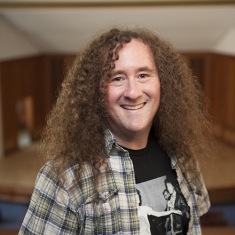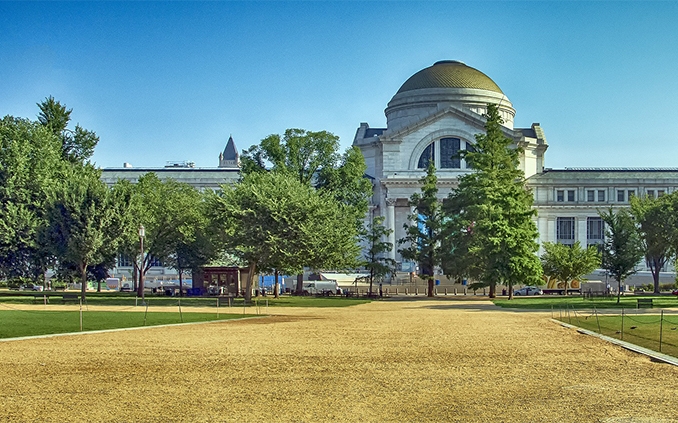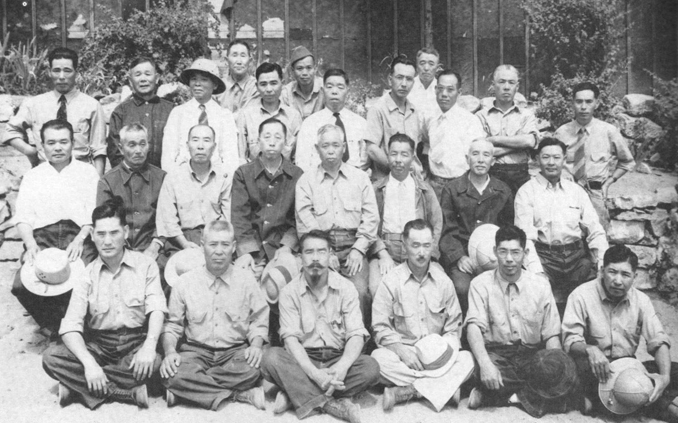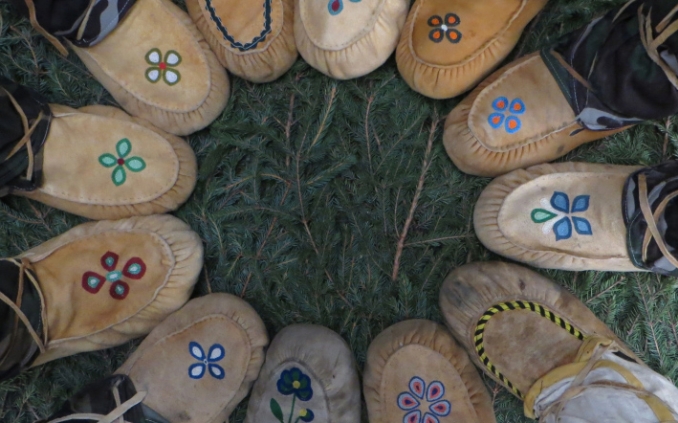The object of inquiry in American studies is culture—usefully defined as a society’s “whole way of life”—the sum of the ways a society and its subjects at once understand and remake the world. Taking the contested and complex geographical, political and cultural space(s) named by America as a field for exploration, we ask how people in these spaces, in the present and in the past, make sense of their world, their relationships and themselves. Because culture includes everything from agriculture and architecture to xenophobia and zoos, American studies draws on the insights and methods of numerous academic disciplines, such as history, economics, sociology, anthropology, literary studies, art history, political science and musicology.
American studies at Smith is an interdisciplinary program that studies the history, culture and society of the diverse peoples who inhabit the contested and complex geographical, political and cultural space(s) named "America." The program brings together faculty and students from a variety of academic fields, including history, English, music, art, film and media studies, indigenous studies, Asian American studies, African American studies, politics, education, women and gender studies, critical disability studies, material culture and museum studies. Thoughtfully choosing among and combining these approaches, we seek a complex and nuanced understanding of American culture that will enable students to become deliberative, critically engaged participants in the United States and the world.
Students majoring in American studies are expected to:
- Interpret culture critically, attentive to the politics and aesthetics of cultural forms, and to the social construction of taste, pleasure, desire and anxiety.
- To understand how power shapes and disguises common‐sense or taken‐for‐granted practices, assumptions and modes of expression.
- Understand how to read ideologically.
- Study history in order to understand the origins of present systems, values, desires.
- Become attentive to the different reading and interpretive strategies required of different cultural forms: textual, visual, auditory, material objects, technologies, built environments and more.
- Engage theory, through reading and writing about theoretical texts.
- Approach problems and questions from a variety of disciplinary perspectives.
- Conduct original, contextualized and independent research, which requires the student to:
- Identify and locate primary sources for cultural analysis.
- Navigate archives effectively.
- Describe—in terms of content and form—primary sources.
- Interpret primary sources by reading them for indications of their expression of broad cultural values, anxieties and desires.
- Formulate a research question in light of issues currently debated in the field and learn how to conduct independent research.
- Identify and locate scholarly and critical materials relevant to research questions.
- Understand and critique scholarly and critical arguments in the field.
- Situate research in ongoing debates in the field.
- Communicate persuasive and well‐grounded arguments orally and in writing.
About the Major
American Studies at Smith is an interdisciplinary program that studies the history, culture and society of the diverse peoples who inhabit the contested and complex geographical, political and cultural space(s) named “America.” Majors in the program develop critical tools for analyzing cultural texts (visual arts, literature, music, fashion, advertising, social media, buildings, objects, bodies, etc.) in relation to political, social, economic, and environmental contexts. Students have wide latitude to choose courses that most interest them, but they must fulfill the three-course core sequence and identify a primary focus that they will explore in at least four courses. Because of the wide-ranging interests and methods included within the interdisciplinary American Studies Program, careful consultation between a student and adviser is crucial to the planning of the major.
Double Majors
Students who double major in American studies and another field normally can count toward the American studies requirements up to four courses used to fulfill the requirements of another major.
Study Abroad
Many American studies majors study abroad either for a year or a semester.
Senior Certification Form
When indicating on the Senior Certification Form which 64 credits were taken outside of the major, an American studies student can list American subject courses that are not American studies courses themselves.
Teaching Certification
American studies majors can become licensed, as undergraduates, to teach in public schools throughout the country. Licensure is available on the elementary, middle or secondary levels. Gaining undergraduate licensure, however, requires careful planning. Students interested in doing this should decide fairly early in their undergraduate careers, usually by the end of sophomore year.
Students who are considering obtaining a teaching license should contact the Department of Education and Child Study.
Major Requirements
The major consists of 10 four-credit courses (40 credits) in the study of American culture and society. Although majors have considerable freedom to choose courses from many different fields and departments, they must satisfy the following requirements:
• Three required “core” courses: AMS 201 (Introduction to American Culture and Society), AMS 202 (Methods in American Studies), and AMS 340 (Capstone).
• Seven elective courses that meet the following distribution requirements. (Note that any single course can fulfill multiple distribution requirements; for example, an AMS-prefixed course could also satisfy the history requirement):
a) Two courses with an AMS prefix (in addition to the core courses).
b) One course that studies the past and explores change over time. (Such courses can be found in a wide variety of departments including AMS, History, Africana Studies, English, Art History, Film and Media Studies, and Government.)
c) One course that studies culture and society from a transnational/diasporic/global/comparative perspective.
d) Three courses, chosen in consultation with the student’s advisor, that engage one or more of the analytic fields below. Students must cover at least three different analytical fields to complete the major:
1. race/ethnicity
2. citizenship/sovereignty
3. dis/ability
4. gender/sexuality
5. class
6. popular culture
7. media
8. visual arts
9. music/sound
10. literature
11. political economy
12. critical science/technology studies
13. empire/settler colonialism
14. Native American and Indigenous studies*
15. Asian/Pacific/American studies*
16. environmental studies
17. history and historicity
18. material culture/museums
19. knowledge production/education/epistemology
*We highlight these fields because they are connected to certificate programs closely associated with AMS at Smith.
Focus
Although AMS emphasizes interdisciplinary study, by the end of their senior year students should be able to name an area of focus in which they have taken 4 courses to identify their personalized pathway through the major. As a reference point, previous examples include Popular Culture, Race & Ethnicity, and Museums & Public History, but we emphasize that each student will construct and name their own focus in consultation with their adviser.
Honors Requirements
Director: Christen Mucher
Honors students write a thesis, usually 50 to 80 pages in length and based on original research. Typically an honors thesis counts for two courses (8 credits) taken in either one or two semesters.
Recent Theses
Examples of completed theses include the following.
- No John Trumbull: Social, Political, and Cultural Resonance of Hamilton: an American Musical
- “The Wife, the Widow”: Narratives of Grief in Contemporary American Memoir
- Tolerance and Trade: Multiculturalism in Seventeenth Century New Amsterdam
- Community Center to Concert Hall: Youth Outreach, Classical Music Publics, and Institutional Discourse
- Performing Liminality: Embodying Disability and Trans Identity Onstage
- History on Display: Commemoration at the 1876 Centennial Exposition
- “Being a Part of Something Special Makes You Special, Right?”: Creating a Glee-ful Community of Jewishness on American Television
- Could I Be Miss America?: An Asian American’s Experience with the Miss America Organization
- A Mixed Memory: Mexican American Studies in the Borderlands
- Recovered Memory: The Making of Profit, Place, and Person at Sierra Tucson Rehab Facility
- Breaking the "Jolly Negro": Racist Material Culture and White Domesticity in the Era of Jim Crow
- Motivation, Meritocracy, and the Model Minority Rights Myth: Representations of Asian Americans in Spelling Bees
AMS 202 Methods In American Studies
Steve Waksman
Monday, 3:05 - 4:20 p.m.
Wednesday, 2:45 - 4:00 p.m.
AMS 227 Trade and Theft in Early America
Christen Mucher
Tuesday and Thursday, 10:50 a.m. - 12:05 p.m.
AMS 238 Only Joking: Race, Gender, and Comedy in American Culture
Kevin Rozario
Tuesday and Thursday, 9:25 - 10:40 a.m.
AMS 355 Tiny Homes in America: Salvaging the Material
Evangeline Heiliger
Thursday, 1:10 - 4:50 p.m.
Cross-Listed Courses
ENG 351np Writing About American Society - Creative Nonfiction Writing through Photography
Russell G. Rymer
Thursday, 1:10 - 4:00 p.m.
AMS 201 Introduction to the Study of American Society and Culture
Evangeline Heiliger and Christen Mucher
AMS 220 Dance, Music, Sex, Romance
Steve Waksman
AMS 239 The Culture Wars
Lane Hall-Witt
AMS 302 Seminar: The Material Culture of New England, 1630-1860
Barbara Mathews
AMS 340 Culture and Crisis
Kevin Rozario
AMS 400 Special Studies
Kevin Rozario
Cross-Listed Courses (TBD)
Executive Committee
Carrie Baker
Sylvia Dlugasch Bauman Professor of American Studies; Professor, Study of Women and Gender
Floyd Cheung
Professor, English Language & Literature
Michael Gorra
Mary Augusta Jordan Professor of English Language and Literature
Lane Hall-Witt
Lecturer and Director, Diploma Program
Alex Keller
Professor, Flim & Media Studies
Daphne Lamothe
Associate Professor, Africana Studies
Jennifer C. Malkowski
Assistant Professor of Film & Media Studies
Christen Mucher
Associate Professor, American Studies
Richard Millington
Professor, English Language & Literature
Samuel Ng
Assistant Professor, Africana Studies
Kevin Rozario
Director, American Studies and Associate Professor, American Studies
Andrea Stephanie Stone
Assistant Professor, English Language & Literature
Michael Thurston
Professor, English Language & Literature
Steve Waksman
Elsie Irwin Sweeney Professor of Music and Professor of American Studies
Frazer Ward
Professor, Art
Emeriti
Daniel Horowitz
Mary Huggins Gamble Professor Emeritus of American Studies
Helen Horowitz
Syndenham Clark Parsons Emerita of History and American Studies
Five College Faculty
Opportunities & Resources
For information on Smith-approved programs abroad that have American studies offerings, see the following.
- University of East Anglia, England
- University of Sussex, England
- University of Wales, Swansea
- University of Toronto
- McGill University
Contact the Office for International Study for more information about opportunities abroad.
Gladys Lampert ’28 and Edward Beenstock Prize
The Gladys Lampert ’28 and Edward Beenstock Prize is awarded for the best honors thesis in American studies or American history.
Eleanor Flexner Prize
The Eleanor Flexner Prize is awarded for the best piece of work by a Smith undergraduate using the Sophia Smith Collection or the Smith College Archives.
Most recent recipient: Claire Bunn `21
Nancy Boyd Gardner Prize
The Nancy Boyd Gardner Prize is awarded for an outstanding paper or other project in American studies by a Smithsonian intern or American studies major.
Most recent recipient: Jamie Mastrogiacomo `22
Donald H. Sheehan Memorial Prize
The Donald H. Sheehan Memorial Prize is awarded for outstanding work in American studies.
Most recent recipient: Claire Baumgardner '19
Students who graduate from Smith College with an A.B. in American studies pursue a range of career alternatives. Each year several of our majors go on to doctoral programs, most often in U.S. history, American literature or American studies.
Many of our graduates go on to graduate or professional work that prepares them for careers in law, business, social work, public policy, elementary and secondary education and communications or graduate programs in historic preservation, material culture or museum studies. Over the course of the years, our majors find careers and life choices that are not markedly different from those who have majored in fields such as history, government, sociology and English.
Smith College Resources
Resources in American Studies at Smith College
The Smith libraries provide links to web resources and databases accessible from the Smith campus.
Sophia Smith Collection
This nationally recognized archive of primary audio and visual documents pertaining to women’s history covers such subjects as birth control, women’s rights, suffrage, the contemporary women’s movement and middle-class family life in 19th- and 20th-century New England.
College Archives
Explore the history of Smith College in student letters, diaries, course notes, photographs and memorabilia, along with more official records from the college’s past.
Mortimer Rare Book Room
Discover medieval manuscripts and printed books from the 15th century to the present in all subjects. The collection is rich in original editions of 19th- and 20th-century American literature and history, especially children's literature, early educational materials, etiquette and advice for women, popular novels, and travel writing by women. It houses a small collection of literary manuscripts by women writers, notably Sylvia Plath and Virginia Woolf.
Smith College Art Museum
Explore the collections of major American and European art from BCE 2500 to the present. The internationally renowned permanent collection is supplemented by a variety of visiting exhibits, lectures and programs.
Resources in the Pioneer Valley
Historic Northampton
Historic Northampton’s collection of more than 500,000 objects and three historical buildings documents the history of Northampton and the Connecticut Valley from Pre-Columbian years to the present.
Porter-Phelps Huntington House
Six generations of the same family lived in this 18th-century Hadley homestead, which features family documents and artifacts. Open seasonally. There is an admission fee.
Historic Deerfield
Historic Deerfield is a museum of New England history and art featuring a collection of 18th- and 19th-century houses and the Flynt Center of Early New England Life, filled with some of the great decorative arts of early America.
Study Options
Contact
Fax: 413-585-3389
Email: jwintjen@smith.edu
Administrative Assistant: Jeanette Wintjen
Individual appointments can be arranged directly with the faculty.










